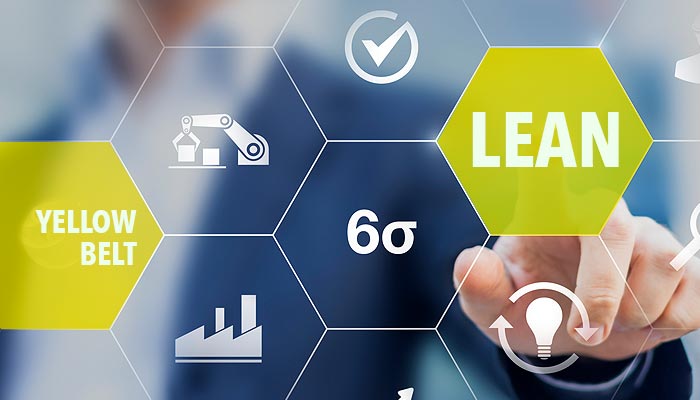Online Lean Six Sigma Yellow Belt Certificate

Learn the Fundamentals of Lean Six Sigma with a Self-Paced Certificate in Lean Six Sigma Yellow Belt
Explore the foundational elements of Lean and Six Sigma methodology to gain an understanding of essential process improvement principles that can help you contribute to Lean Six Sigma projects within your organization.
Through our 16-hour, self-paced course, you will learn fundamental Lean Six Sigma terminology and concepts, discover common Lean and Six Sigma tools that are used to help improve product quality and eliminate waste from processes, and learn how the two methodologies intersect to help businesses increase their competitive advantage. And, with six months of access to the material, you’ll be able to re-review the course content as many times as you need to, to ensure your full comprehension of the material.
Request More Information or Register for Class
Audience
The Yellow Belt program is designed for entry- and mid-level professionals with or without management experience who want to learn or sharpen their process improvement skills, as well as senior leaders who would benefit from a high-level overview of Lean Six Sigma methodology to champion process improvements at their organization.
Yellow Belt training provides professionals with the core concepts of Lean and Six Sigma methodologies that can help them assist with process improvement projects and apply basic strategies in their day-to-day tasks.
Program Objectives
Upon your successful completion of the Lean Six Sigma Yellow Belt course, you will be able to:
Recognize common Lean and Six Sigma terminology, tools, and concepts
Define the DMAIC (define, measure, analyze, improve, control) approach to process improvement
Identify and support potential Lean Six Sigma project opportunities consistent with organizational needs
Understand the language of Lean Six Sigma and participate in discussions about quality improvement initiatives
What You Will Learn
Learn fundamental concepts of Lean and Six Sigma methodology to support process improvement projects in your organization.
What is Lean Six Sigma? – Learn the history of Lean Six Sigma, roles and responsibilities of Lean Six Sigma practitioners, and common tools of the methodology.
DMAIC – Learn to identify the five phases of DMAIC (define, measure, analyze, improve, control) and the tools and concepts that apply to each phase.
What is Lean? – Understand the five principles of Lean methodology and how its tools focus on creating value and eliminating wasteful activities.
Additional Lean Topics – Learn additional Lean concepts such as Poka-Yoke and Kaizen events, as well as the critical success factors for process improvement projects.
Certificate Requirements
This self-paced program consists of 16 hours of instruction separated into four modules. Students should expect to commit four (4) hours to each module.

Program Badge
To receive the Yellow Belt certificate badge, students must successfully complete all online course materials and earn a passing score of 70% or higher on course quizzes.
Prerequisites
There are no prerequisites for this program.
Certificate overview
Time commitment
16 hours
Cost
$495
Length of access
6 months
Course Content Summary
Week 1: Lean Six Sigma
- Lean Six Sigma Overview and Six Sigma History
- Lean History and Lean Six Sigma Benefits
- Lean Six Sigma Roles and Responsibilities
- Voice of the Customer
- What is value?
- What is process improvement?
- Definition of quality
- Understanding variation
- The 6 M’s
- Bell Curve
- Measures of central tendency
- Measures of dispersion
- Histograms
Week 2: DMAIC
- The five phases and 15 tollgates
- Project Charters
- Process Maps
- Baseline Measurement
- Root Cause Analysis
- Pareto charts
- Implementing improvements
- Team Dynamics
Week 3: Lean
- Lean and efficiency
- Waste walks
- Value stream mapping
- Kanban
- Quick changeovers
- Spaghetti diagrams
- One piece flow
Week 4: Additional Lean Topics
- 5S principles
- Standard work
- Mistake proofing
- Kaizen events
- Lean Six Sigma
- Lean Six Sigma teams and roles
Request More Information